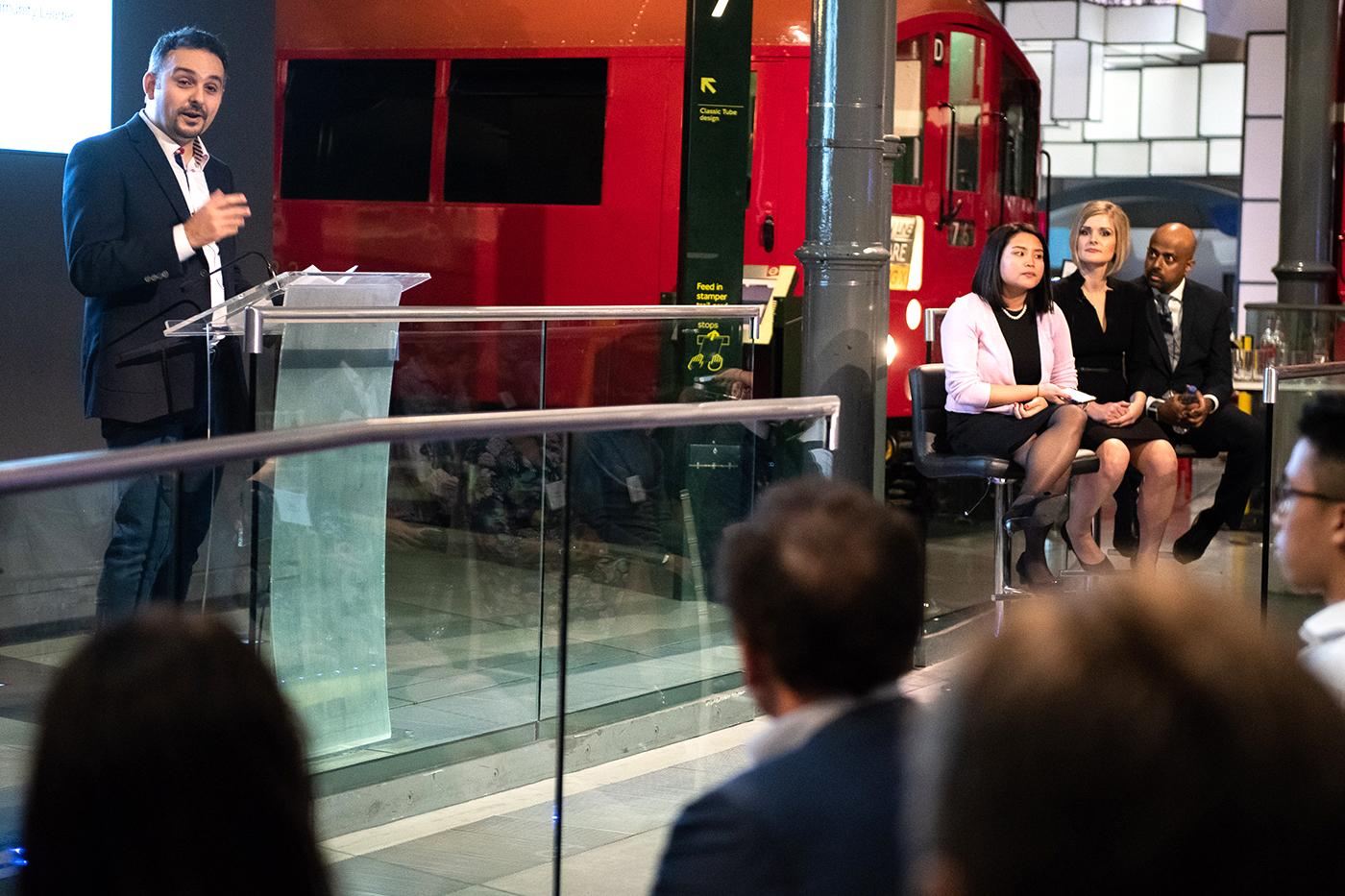
By Khalida Sarwari
News at Northeastern
At many of London’s eateries, it’s not uncommon to see hungry patrons clamoring for a table during the 6 o’clock dinner rush. But during the day, the restaurants often sit idle, bereft of crowds. Seeing an opportunity within this lull in the day, Northeastern graduate Van Sharma hatched an idea.
What if these spaces didn’t need to sit empty for half the day? What if they could be repurposed for other uses during periods of downtime, he thought, to provide a workspace for the entrepreneurs and freelancers who call London home?

Zach Mammadov, who co-founded WorkSpott, moderated a Q&A with Northeastern graduates at the London Transport Museum in October of 2018. Photo courtesy of Duncan Soar.
Sharma pitched his idea of turning underused venues into workspaces to fellow Northeastern graduate and London transplant Zach Mammadov last year. A few months later, they had launched WorkSpott , a startup that transforms underused restaurants and bars across the city into workspaces for those who don’t need traditional offices to get things done.
“Central London is home to hundreds of underutilized urban spaces, including bars, hotels, and restaurants,” says Sharma, who graduated from Northeastern in 2011 with a bachelor’s degree in political science and international affairs and then returned to the university to earn his master’s degree in global studies and international relations in 2013. “It’s a real shame that some of the best commercial real estate in the world essentially sits underutilized during non-peak hours.”
Sharma and Mammadov have persuaded two restaurants and bars to transform their unused space into drop-in workspaces and expect to add a third location in East London soon. Their selling point is that such a model would boost their clientele during non-peak hours.
“We bring to them new people that would otherwise not come to them organically,” says Mammadov, who graduated from Northeastern in 2003 with a master’s degree in economics and went on to found a marketing and advertising company in London called Signeer. “They also get compensated depending on how much traffic they receive each day, as well as for the additional food and beverage sales we bring them.”
Sharma and Mammadov launched WorkSpott at Drake and Morgan in King’s Cross, the flagship property of a collection of cocktail bars and restaurants across London. Now, during the day, its Green Room Bar doubles as a workspace for freelance and remote workers.
“It’s amazing to see the types of diverse individuals that walk through the door, and hearing what they are all up to,” says Sharma. “It’s an exciting time to be in this space.”
Entrepreneurs, freelancers, and small business owners who use WorkSpott pay a subscription-based fee to work at either of the startup’s two locations, which promise users the convenience of a home office in addition to discounts on food, drinks, and services. Users are also provided opportunities and resources for networking and personal development, perks that Sharma and Mammadov say help distinguish WorkSpott from workspaces that are typically favored by remote workers, such as coffee shops.
“In a coffee shop you’re not going to find yourself as part of a community,” says Mammadov, who is a member of Northeastern’s Young Global Leaders program, which comprises more than 100 recent graduates who advise university leadership and help to strengthen Northeastern’s network of international alumni. “Usually people are sitting isolated. They’re not guaranteed a place, or there are distractions. If you’re trying to start a business, you have to have a place where you can focus on your work and be part of a like-minded workspace environment.”
Workspott is classified as a shared economy business, which includes companies such as Airbnb and Uber that make money by using existing resources. Sharma and Mammadov hope to use social media and word of mouth to increase their startup’s clientele and expand their business to other neighborhoods within London and across Europe.
“What we are saying is instead of creating more office space, it’s much better to use already underutilized spaces to create a working environment,” says Mammadov.
(Reprinted with permission from News at Northeastern.)


















